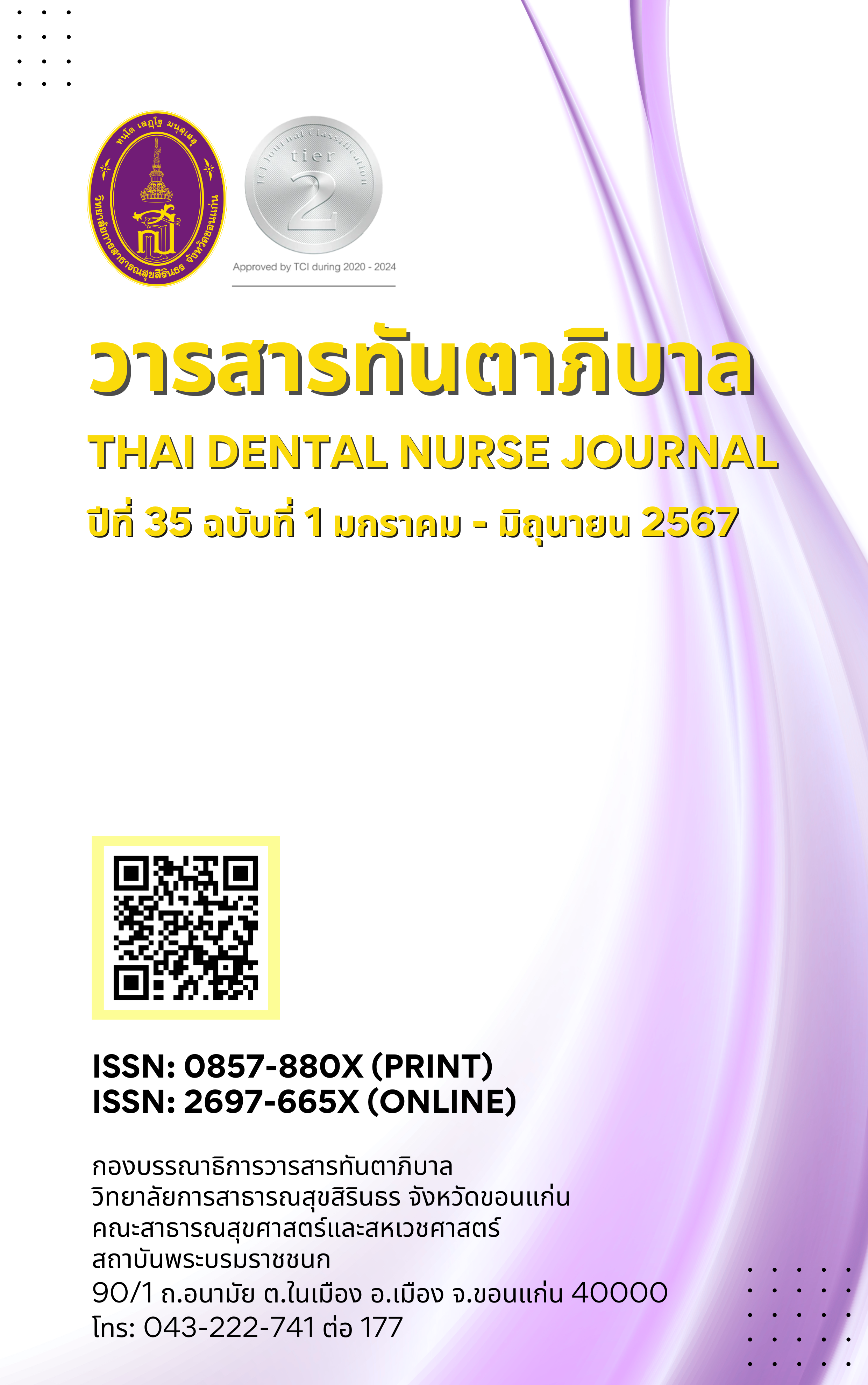ปัจจัยที่มีความสัมพันธ์กับปริมาณการบริโภคเครื่องดื่มรสหวานผสมน้ำตาล ของบุคลากรทางการแพทย์
คำสำคัญ:
เครื่องดื่มรสหวานผสมน้ำตาล, บุคลากรทางการแพทย์, ปัจจัย, ความสัมพันธ์บทคัดย่อ
การศึกษานี้เป็นการศึกษาแบบภาคตัดขวางเชิงพรรณนา มีวัตถุประสงค์เพื่อศึกษาปัจจัยที่มีความสัมพันธ์กับปริมาณการบริโภคเครื่องดื่มรสหวานผสมน้ำตาล ดำเนินการศึกษาโดยใช้แบบสอบถามในบุคลากรทางการแพทย์ จำนวน 194 คน วิเคราะห์ข้อมูลโดยใช้สถิติพรรณนาและสถิติอนุมาน ได้แก่ การทดสอบ ไคสแควร์
ผลการศึกษา พบว่า เครื่องดื่มที่บุคลากรทางการแพทย์นิยมมากที่สุด ได้แก่ กาแฟและชา คิดเป็นร้อยละ 55.6 สาเหตุที่เลือกดื่มเครื่องดื่มที่มีน้ำตาลน้อยเนื่องจากดีต่อสุขภาพ ร้อยละ 52.1 บุคลากรกว่าสองในสามดื่มเครื่องดื่มที่ทำงาน ร้อยละ 64.4 โดยบุคคลในครอบครัว เพื่อนร่วมงาน และสื่อต่าง ๆ เช่น โปสเตอร์ หนังสือพิมพ์ อินเทอร์เน็ต มีอิทธิพลต่อการบริโภคเครื่องดื่มของบุคลากร ร้อยละ 80.9 และ 74.2 เพศมีความสัมพันธ์กับปริมาณการบริโภคเครื่องดื่มรสหวานผสมน้ำตาลอย่างมีนัยสำคัญทางสถิติ (p-value <0.001, OR=0.16, 95% CI: 0.08-0.34) ปัจจัยด้านเศรษฐกิจและด้านพฤติกรรมมีความสัมพันธ์กับปริมาณการบริโภคเครื่องดื่มรสหวานผสมน้ำตาลอย่างไม่มีนัยสำคัญทางสถิติ โดยสรุป นอกจากปัจจัยเพศแล้ว ประเด็นทางสังคมวัฒนธรรมและสิ่งแวดล้อมมีแนวโน้มที่จะส่งผลต่อการบริโภคเครื่องดื่มรสหวานผสมน้ำตาลเพิ่มมากขึ้น จึงควรมีการดำเนินนโยบายอย่างจำเพาะเจาะจงในการลดปริมาณและความถี่ในการบริโภคน้ำตาลจากเครื่องดื่มรสหวานผสมน้ำตาลในกลุ่มบุคลากรทางการแพทย์
เอกสารอ้างอิง
Della Corte K, Fife J, Gardner A, Murphy BL, Kleis L, Della Corte D, et al. World trends in sugar-sweetened beverage and dietary sugar intakes in children and adolescents: a systematic review. Nutr Rev. 2021; 79(3): 274-88.
ปริยดา ปิยกุลมาลา, กิตติศักดิ์ เทพวงษา. ปัจจัยที่มีผลต่อภาวะโภชนาการเกินของนิสิตแพทยศาสตร์ มหาวิทยาลัยมหาสารคาม ชั้นปีที่ 4-6 ศูนย์แพทยศาสตร์ศึกษา โรงพยาบาลกาฬสินธุ์. วารสารอนามัย สิ่งแวดล้อมและสุขภาพชุมชน. 2561; 3(2): 30-45.
Garber AK, Lustig RH. Is fast food addictive? Curr Drug Abuse Rev. 2011; 4(3): 146-62.
Ifland JR, Preuss HG, Marcus MT, Rourke KM, Taylor WC, Burau K, el at. Refined food addiction: a classic substance use disorder. Med Hypotheses. 2009; 72(5): 518-26.
พิมพ์นภาณัท ศรีดอนไผ่, ปิยณัฐ ศรีดอนไผ่, ประภาศรี ภูวเสถียร, ยุพาพร นาคงามอนงค์, ประไพศรี ศิริจักรวาล. ปริมาณน้ำตาลในเครื่องดื่มรสหวานที่จำหน่ายในมหาวิทยาลัยและบริเวณโดยรอบ กรณีศึกษามหาวิทยาลัยมหิดล วิทยาเขตศาลายา. วารสารสาธารณสุขศาสตร์. 2562; 49(1): 32-44.
World Health Organization. Guideline: Sugars Intake for Adults and Children. Geneva: World Health Organization; 2015.
ศูนย์เทคโนโลยีอิเล็กทรอนิกส์และคอมพิวเตอร์แห่งชาติ. FoodChoice : ครอบครัวสุขภาพดี เพราะมีแอปฯ. [เข้าถึงเมื่อ 11 ก.ย. 2564] เข้าถึงได้จาก: https://www.nectec.or.th/innovation/innovation-mobileapplication/foodchoice.html
Muangsri K, Tokaew W, Sridee S, Chaiyasit K. Health communication to reduce sugar consumption in Thailand. Functional Foods in Health and Disease. 2021; 11(10): 484-98.
Karpinski TM, Szkaradkiewicz AK. Microbiology of dental caries. J Biol Earth Sci. 2013; 3(1): M21-M24.
ปิยะดา ประเสริฐสม. สถานการณ์โรคฟันผุในเด็กปฐมวัยกับการบริโภคน้ำตาล. วิทยาสารทันตสาธารณสุข. 2545; 7(1): 70-81.
Sylvetsky AC, Welsh JA, Brown RJ, Vos MB. Low-calorie sweetener consumption is increasing in the United States. Am J Clin Nutr. 2012; 96(3): 640-46.
Hayes C. The effect of non-cariogenic sweeteners on the prevention of dental caries: a review of the evidence. J Dent Educ. 2001; 65(10): 1106-109.
US Department of Agriculture, US Department of Health and Human Services. Dietary Guidelines for Americans, 2015-2020. 8th ed. Washington DC: Government Printing Office; 2015.
Lin TT, Guo YL, Gordon C, Cayanan E, Chen YC, Ouyang CM, et al. Association Between Sugar-Sweetened Beverage Consumption as Meal Substitutes, Workload, and Obesity in Nurses: A Cross-Sectional Study. Int J Environ Res Public Health. 2019; 16(24): 4984.
สุดปรารถนา หนึ่งน้ำใจ, กรรณิกา แสนสุข, กิตติมา วงษ์คำ, ชนากานต์ จันทะวงค์, ชมพูพรรณ กันตา, ปรารถนา ภักดีแดง และคณะ. ปัจจัยที่มีความสัมพันธ์ต่อพฤติกรรมการบริโภคชานมไข่มุก ของนิสิตคณะแพทยศาสตร์ มหาวิทยาลัยแห่งหนึ่งในภาคเหนือ. วารสารศูนย์อนามัยที่ 9 : วารสารส่งเสริมสุขภาพและอนามัยสิ่งแวดล้อม. 2564; 15(36): 63-71.
Daniel WW. Biostatistics: A foundation for analysis in the health sciences. New York: Wiley & Sons; 1995.
ปาจรีย์ อับดุลลากาซิม, นิภา มหารัชพงศ์. พฤติกรรมการบริโภคเครื่องดื่มให้พลังงานของวัยรุ่น ภาคตะวันออก. วารสารวิชาการสาธารณสุขชุมชน. 2564; 7(2): 72-85.
Malinauskas BM, Aeby VG, Overton RF, Carpenter-Aeby T, Barber-Heidal K. A survey of energy drink consumption patterns among college students. Nutr J. 2007; 6: 35.
Leslie JH, Braun KL, Novotny R, Mokuau N. Factors affecting healthy eating and physical activity behaviors among multiethnic blue- and white-collar workers: a case study of one healthcare institution. Hawaii J Med Public Health. 2013; 72(9): 300-6.
Fontes AS, Pallottini AC, Vieira DADS, Fontanelli MM, Marchioni DM, Cesar CLG, et al. Demographic, socioeconomic and lifestyle factors associated with sugar-sweetened beverage intake: a population-based study. Rev Bras Epidemiol. 2020; 23: e200003.
Hasan T, Sultana M, Shill LC, Sultana S. Consumption of energy drink and associated factors: Experience from students of public university in Bangladesh. Nutrition & Food Science. 2019; 50: 131-42.
Wang CW, Chen DR, Chan CC, Yeh YP, Chen HH. 'I Knew I Should Stop, but I Couldn't Control Myself': a qualitative study to explore the factors influencing adolescents' consumption of sugar-sweetened beverages and sugary snacks from a socio-ecological perspective. Public Health Nutr. 2022; 25(9): 2465-474.
ทิพนาถ วิชญาณรัตน์, สิรินทิพย์ อมรสุรเดช, รักษณัณน์ การเวกปัญญาวงศ์. การบริโภคเครื่องดื่มที่มีรสหวานและความรู้ในนักศึกษาทันตแพทย์. วิทยาสารทันตแพทยศาสตร์ มหาวิทยาลัยขอนแก่น. 2020; 23(2): 11-21.
กวินตา วิเศษแก้ว, เบญจา มุกตพันธ์. ความสัมพันธ์ระหว่างความรอบรู้ด้านโภชนาการกับการบริโภคขนมและเครื่องดื่มรสหวานของนักศึกษาระดับปริญญาตรีกลุ่มวิทยาศาสตร์สุขภาพ มหาวิทยาลัยขอนแก่น. ศรีนครินทร์เวชสาร. 2563; 35(2): 183-92.
Epel ES, Hartman A, Jacobs LM, Leung C, Cohn MA, Jensen L, el at. Association of a Workplace Sales Ban on Sugar-Sweetened Beverages With Employee Consumption of Sugar-Sweetened Beverages and Health. JAMA Intern Med. 2020; 180(1): 9-16.
ดาวน์โหลด
เผยแพร่แล้ว
ฉบับ
ประเภทบทความ
สัญญาอนุญาต
ลิขสิทธิ์ (c) 2024 วารสารทันตาภิบาล

อนุญาตภายใต้เงื่อนไข Creative Commons Attribution-NonCommercial-NoDerivatives 4.0 International License.
บทความที่ได้รับการตีพิมพ์ถือเป็นลิขสิทธิ์ของวารสารทันตาภิบาล





